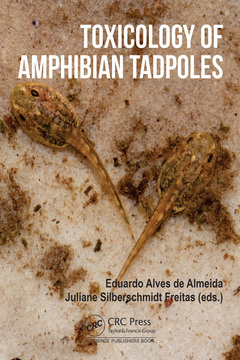Toxicology of Amphibian Tadpoles
Coordonnateurs : Alves de Almeida Eduardo, Freitas Juliane Silberschmidt

Anuran amphibians are among the animal groups with the highest rate of population decline on the planet. Among the factors driving this decline are environmental pollutants, whose negative effects on larvae and tadpoles are still relatively little studied. This is the first book devoted entirely to studying the effects of environmental pollutants on amphibian tadpoles. Throughout its 14 chapters, various aspects of the toxic effects of different classes of environmental contaminants are explored, such as the toxicokinetics of toxic compounds in tadpoles and their health effects, which may result in negative consequences at populations level.
How Pollutants are Affecting Amphibian Tadpoles: Relationship with Anthropogenic Pollutants and Perspectives for the Future. The Importance of Tadpole Staging in Ecotoxicological Studies. Toxicokinetic Pathways of Environmental Contaminants in Amphibian Tadpoles. Hierarchical Levels of Biomarkers in Amphibian Tadpoles Exposed to Contaminants: From Enzyme Disruptions to Etho-Toxicology Studies in Argentina. Effects of Pollutants on the Endocrine System of Tadpoles. Pollutants and Oxidative Stress in Tadpoles. Genotoxicity and Mutagenicity in Anuran Amphibians. Pollutant Effects on Immune Defense Cells of Anuran Tadpoles. Pollutant Effects on Tadpole’s Microbiota. Effects of Pharmaceutical Compounds in Tadpoles. Pesticide Effects on Tadpole’s Survival. Pesticide Effects on Growth and External Morphology of Larvae and Metamorphs (Amphibia, Anura): Evidence From Experimental Studies. Ecotoxicological Impacts of Metals on Amphibian Tadpoles. Developmental Abnormalities in Tadpoles as Biomarkers to Assess the Ecotoxicity of Traditional and Emerging Pollutants.
Eduardo Alves de Almeida is a biologist with Ph.D. in Biochemistry, and is a full professor at the Regional University of Blumenau, Brazil. He has extensive experience in ecotoxicology, working since 1996 on the effects of environmental pollutants on aquatic vertebrates and invertebrates. He currently coordinates the Center for Studies in Aquatic Toxicology, at the Regional University of Blumenau, where he conducts studies on the effects of pesticides and pharmaceutical compounds on amphibian tadpoles.
Juliane Silberschmidt Freitas is a biologist with a Ph.D. in Animal Biology from the State University of São Paulo, Brazil. Her Ph.D. internship was held at the University of California (UCR) and postdoctoral in Ecotoxicology at the University of São Paulo (USP). Research on amphibians began in 2008 and since 2013 she has been dedicated to understanding the impacts of contaminants on tadpoles. Currently, she teaches Animal Physiology at the University of Minas Gerais (UEMG).
Date de parution : 12-2023
17.8x25.4 cm



